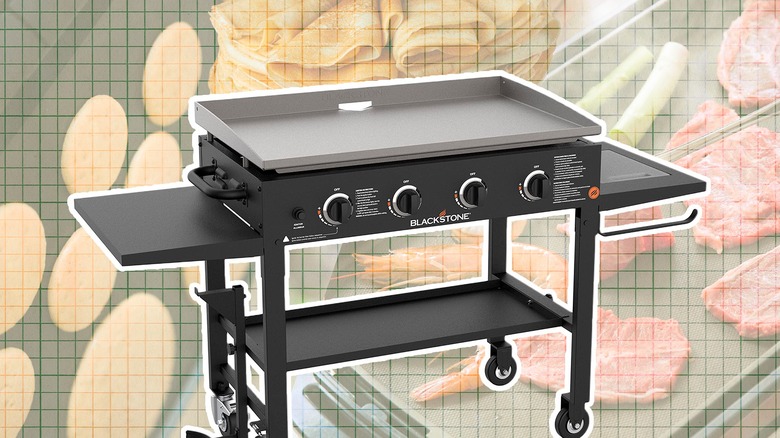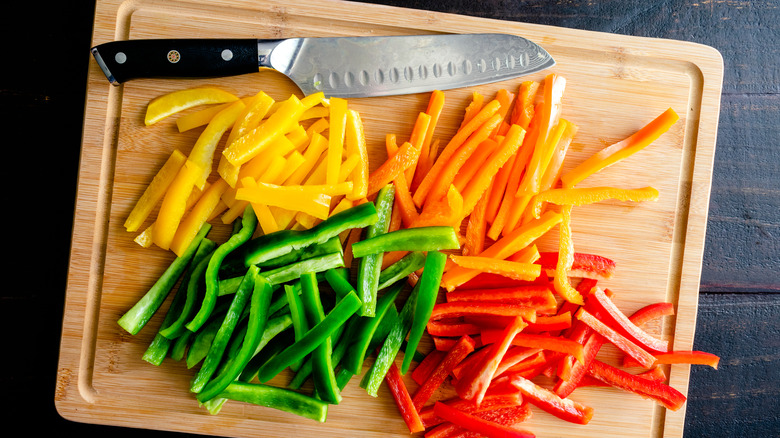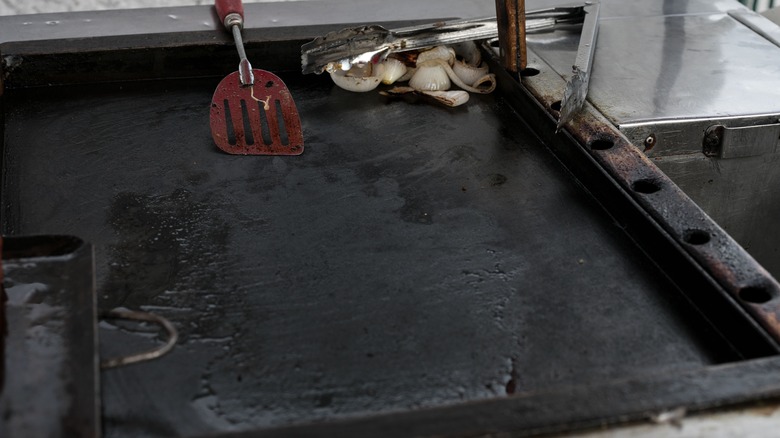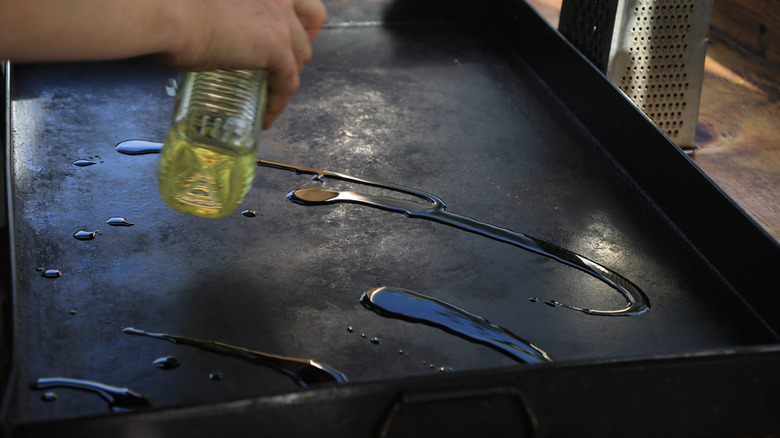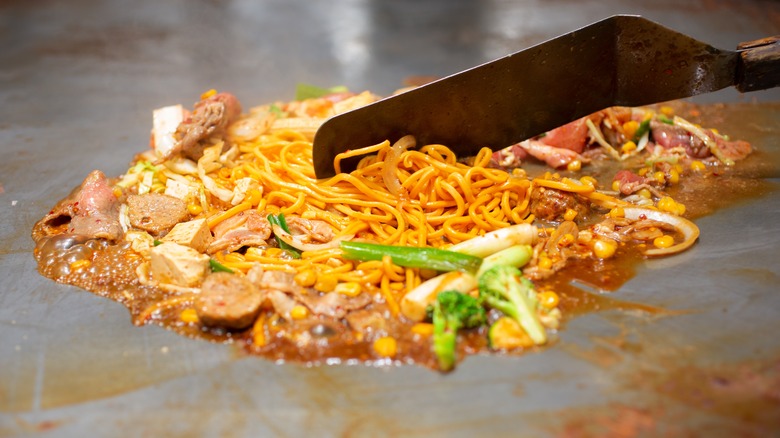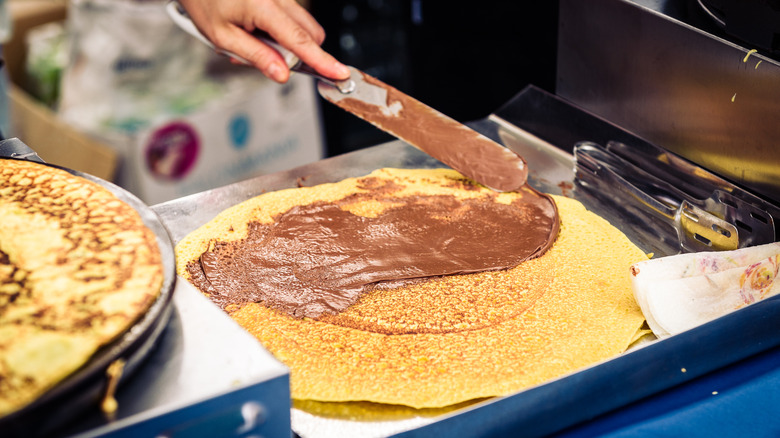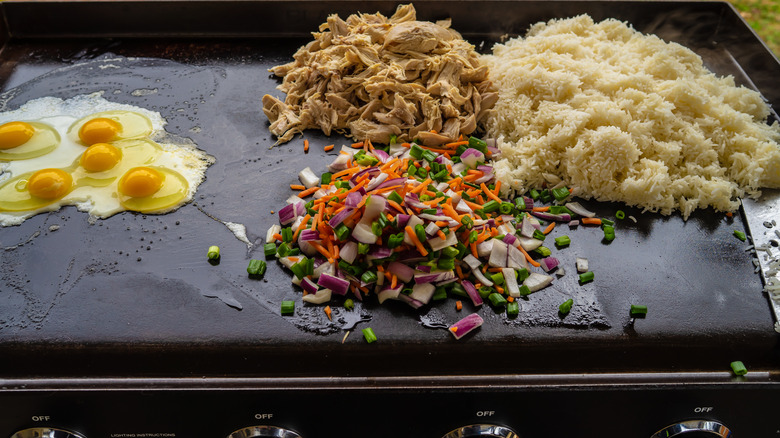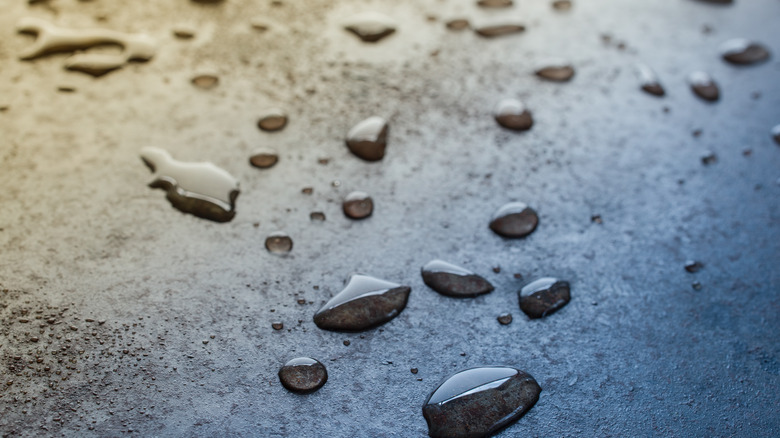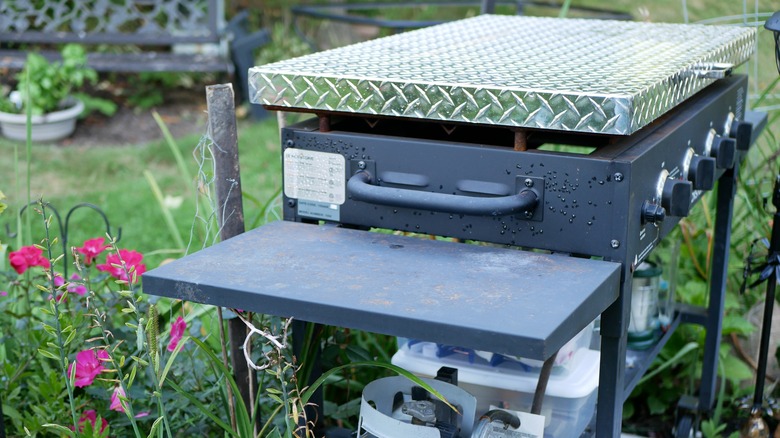9 Tips And Tricks For Using A Blackstone Griddle, According To A Trained Chef
Blackstone griddles are versatile outdoor cooking appliances that feature a large, flat cooking surface heated by propane or natural gas. They are popular for their ability to cook a wide range of foods, from breakfast staples like pancakes and bacon to dinner favorites like steaks, smash burgers, stir-fries, and vegetables. Blackstone griddles are known for even heat distribution, making them ideal for achieving perfect sears. They've become so popular in recent years that they're TikTok famous, and even chefs have joined the Blackstone bandwagon.
Michigan-based Chef Sherry Ronning is one such Blackstone devotee. "I fell in love with griddle cooking after buying the 36-inch Blackstone griddle for my husband," she tells Tasting Table. "I cooked on it way more than he did." She loved the griddle so much, in fact, that she built a business around it. When looking for tips and tricks to using a Blackstone, Ronning is clearly a good source to turn to.
"Teaching others about cooking on a Blackstone griddle is a passion of mine," Ronning says. She shares her griddle recipes on her website, From Michigan to the Table, and also teaches students how to cook on and care for their Blackstone griddles with her My Griddle Secrets online griddle cooking course. It's worthwhile advice: Griddle cooking gives users commercial kitchen options at home in terms of space and the ability to cook multiple things at once with different cooking zones and temperatures.
Season your Blackstone at least three times before the first use
In order to get the best results and most flavorful food from your Blackstone griddle, you need to season it before you use it. Seasoning the griddle serves multiple purposes. It turns the griddle's metal cooktop into a nonstick surface, and the seasoned layer adds flavor to whatever you cook. The experts at Blackstone recommend seasoning your griddle at least three times before using it.
To season your griddle, turn it on high until the surface starts to turn brown. Chef Sherry Ronning advises spreading a thin layer of oil on the hot surface and letting it burn off, similar to creating the nonstick surface layer of a cast iron pan. "Doing this step three times adds layers of the nonstick surface," she says. According to Ronning, the triple layer will "help protect the griddle from rusting and from food sticking while cooking."
By seasoning in multiple stapes, you will add to the griddle's longevity and create a black, nonstick coating that won't scratch. Properly seasoning your griddle surface will also help protect it from rust.
Griddles cook fast, so prep your ingredients before
Preparation is an important step no matter how or what you're cooking. Getting your ingredients prepped and ready before you start cooking, also known as mise en place, is one of the first techniques you learn in culinary school. The idea behind it is that having each ingredient prepped allows you to focus solely on the cooking at hand once you start. Gone are the days of trying to manage your time by hurriedly chopping one ingredient while another sautés. Mise en place is the norm in professional kitchens, and it's just as effective in your home kitchen, especially when you're cooking on a Blackstone griddle.
"Griddle cooking is a very fast cooking method," says chef Sherry Ronning. She recommends looking over your recipe before turning on the griddle and prepping each ingredient in its own bowl. "I recommend using a sheet pan to place all your prepped ingredients on to take them easily to the griddle," she advises.
Prepping your ingredients makes it easier to manage multiple dishes or cooking steps simultaneously on the griddle's surface. You should also make sure all of your utensils are ready and within reach.
Scrape away food and oil after each use
Once you've invested in a Blackstone griddle, keeping it clean is essential to ensure it works properly and to preserve the life of your griddle. In addition to seasoning it, it's also imperative that you clean it after each and every use. A clean Blackstone griddle surface prevents residue buildup, which can lead to uneven cooking and negatively affect the flavor of foods you cook on it.
You can't clean your griddle the same way you might clean your favorite pan or grill, or you might damage the seasoning layer. The first step to clean your griddle, after making sure it has gone cold, is to remove any food bits left on the grill's surface.
"After cooking, turn off the griddle and scrape off any debris and oil into your grease trap," advises chef Sherry Ronning. She tells Tasting Table that a good strategy is to second the scraping with paper towels, followed by a clean, dry cloth. The process can be repeated as many times as needed to clean the griddle fully. Remember that once your griddle is clean, the final step is to season the surface by using a paper towel to spread a thin layer of oil evenly over it.
Don't rule out lower smoke point oils for seasoning
Selecting the right oil for cleaning your Blackstone griddle is crucial for maintaining its performance and longevity. Since the oil is heated during seasoning, you might first think of oils that have a high smoke point to use as seasoning. Blackstone sells its own brand of seasonings for the griddle, but according to chef Sherry Ronning, it's safe to use many of the oils you likely already have on hand.
"If you don't want to use [Blackstone's] seasoning, they also recommend canola oil, flax oil, vegetable oil, shortening, or olive oil," Ronning says. "I personally have used olive oil and the Blackstone Griddle Seasoning, and both worked just fine."
Smoke point is the temperature at which an oil begins to break down and smoke. Once this happens, the oil can become harmful to consume, which is why oils with higher smoke points are often preferred for cooking. The most common high-smoke point oil is canola oil, which has a smoke point between 450 and 470 degrees Fahrenheit.
Lower smoke point oils, like flaxseed oil, might not seem like the best choice, but they can be used to season your grill fast. Because of their low smoke point — flaxseed oil has a smoke point of 225 degrees Fahrenheit — they polymerize quickly. Polymerization is the process that occurs when oils are heated and then dry to create a hard, smooth, semi-non-stick surface on your griddle.
Your approach to preheating should change with ingredients
Preheating your griddle is just as important as preheating a pan on your stovetop. Unless your recipe says otherwise, any cooking surface should be preheated before food is added to cook your food properly.
According to chef Sherry Ronning, "Preheating your griddle is a must. The whole goal is to get a nice golden-brown color to your food. Remember that color adds flavor," she says.
How you preheat your Blackstone depends on the state of your griddle and what you're cooking. If you have leftover oil residue on your griddle, preheat it with a closed lid on high heat. The heat will burn the residue off. You can then reduce the heat to suit the food you're cooking, if necessary. Start preheating with your griddle on low or medium if you need time to gather and prep your ingredients. If you're planning to add fresh-from-the-fridge or frozen food to the griddle, preheat at a high temperature. This will compensate for the temperature drop that will come when the cold food is added.
Your Blackstone griddle is good for desserts
There's more to Blackstone griddle cooking than pancakes and hamburgers. While the griddle is the perfect tool for these foods, especially if you're cooking for a crowd, you can also use it to prepare some of your favorite desserts.
Blackstone encourages its griddle owners to use them to make sweet treats like crepes, dessert pizzas, tapioca, griddled fruit, and even cookies. One of chef Sherry Ronning's specialties is making desserts on the griddle. As a professional baker of 20 years, she has some specific techniques she recommends. In particular, she tells us that using the griddle's dome lid to create an oven effect can create endless possibilities.
"I have baked griddle cookies, cupcakes, mini cakes, cobblers, apple crisp, brownies, and smores dip," she says. Similarly, Blackstone sells a crepe-spreading tool for its griddles; the wide surface area of the cooktop is ideal for creating the thin treats.
When making desserts, the dome lid is instrumental in baking on the griddle. It traps the heat in a pocket while the base of the griddle sears in a way that the oven cannot. Although desserts are a focus, the griddle is also effective for steaming food and melting cheese on burgers.
Zone cooking is ideal on a Blackstone griddle
Zone cooking is another perk of using a Blackstone griddle. If your Blackstone has two or four burners, you should adjust them to create different zones at different temperatures. The ability to vary the heat level on your flat top makes it easy to accomplish multiple tasks at once. You can sear meats in the center, saute vegetables on one side, and keep things warm on the other. Mastering the zones can make you a more efficient cook, but Sherry Ronning tells us that there is a specific strategy for using different zones effectively.
She recommends considering where the natural hot and cold spots on your griddle lie. "Usually, the center of the griddle is hotter than the outer edges," she says. Because of this, it's best to keep your searing zone in the middle while using the edge zones to cook to internal temperatures or keep your food warm. Ronning says to remember to cook directly over the burners.
"If you have pieces of your food cooking faster than others, move them to the outside edge of the griddle to slow the cooking down," she advises. Learning to manipulate your griddle's zones allows even a novice to make food like a short-order cook, preparing numerous dishes at once.
Water can remove stuck food, but don't use too much
Water is often the first thing cooks reach for when they're cleaning up a mess in the kitchen. From countertop spills and washing dishes to getting cooked-on bits of food off your stovetop, water can make quick work of all of these tasks. Blackstone griddle users should proceed with caution when using water on their griddles.
You can use water when while cooking on your griddle, but in small quantities. "A squirt of water should only be used to help steam food as it is cooking on the griddle," per chef Ronning. "If you are using a lot of water for cleaning purposes, stop."
Blackstone griddles are constructed with very thin steel sheets, which make them more sensitive to temperature changes than thicker metals. Sudden changes in temperature, like those resulting from adding a lot of water to a hot griddle, can cause the griddle's metal sheets to warp. The experts at Blackstone advise cooks not to pour a lot of water on the cooktop while it's hot. If you're determined to use water to clean the griddle, it should only be used in small quantities to prevent warping. You should wait until your grill is completely cooled before you apply it.
Prevent any moisture when storing your Blackstone griddle
Moisture is the enemy of Blackstone griddles, so it's imperative that you protect your grill from the elements. Any exposure to moisture can cause your griddle to rust, so proper storage is a must.
"Once your griddle is properly cleaned and seasoned, you need to cover it to protect the whole unit," says chef Sherry Ronning. She advises investing in both hard and soft top covers. A hardcover will protect the surface of the grill, while a soft cover can cover the entire body of the apparatus. Using both protects your cooking surface from weather, dust, pollen, and creepy crawlers.
Griddles should be stored in a cool, dry place, so if you have the space in a garage or outhouse, make sure to stash your equipment there. Chef Ronning recommends investing in a grease trap cover to keep rodents from getting on your griddle during storage. Covers also safeguard your griddle from scratches and dirt buildup.
